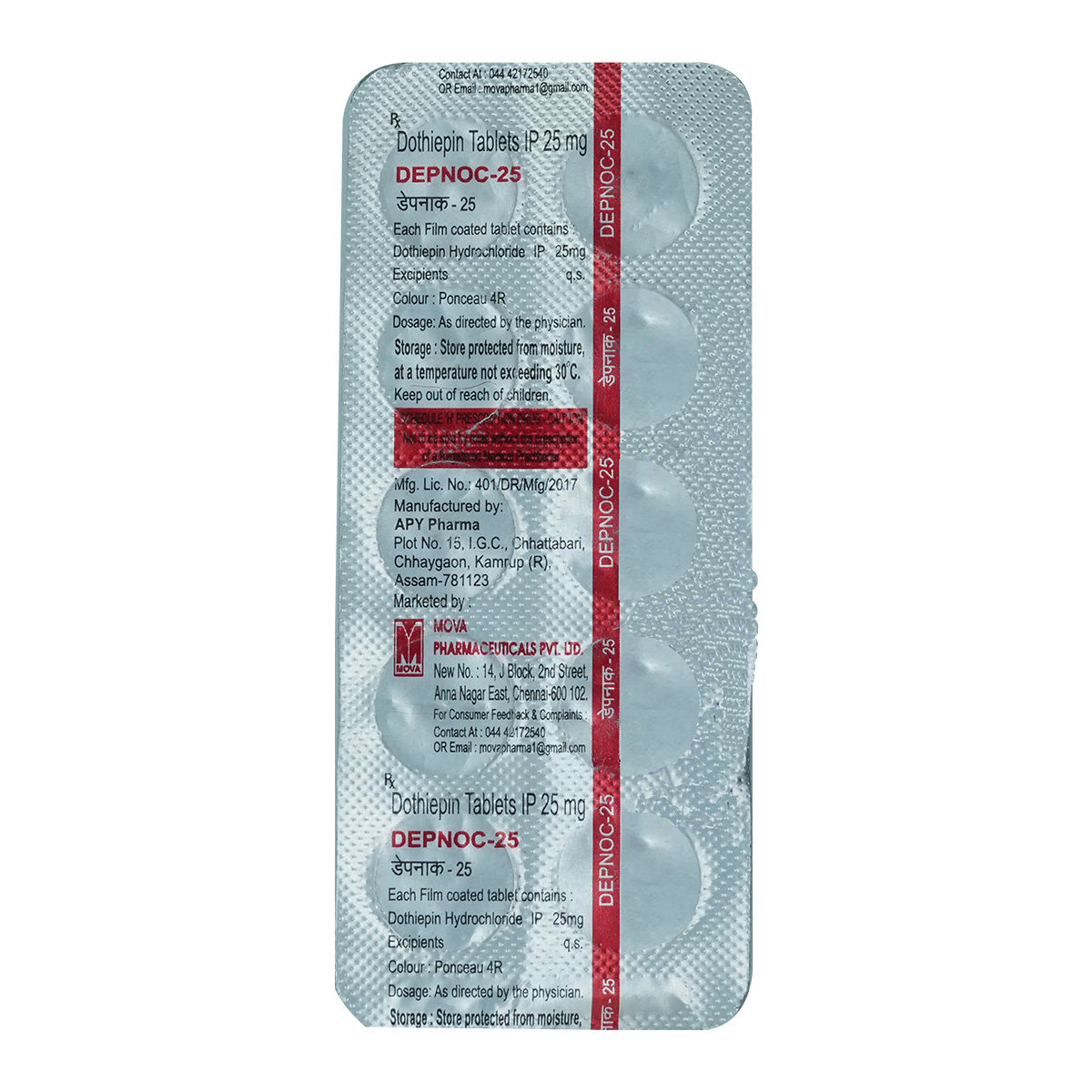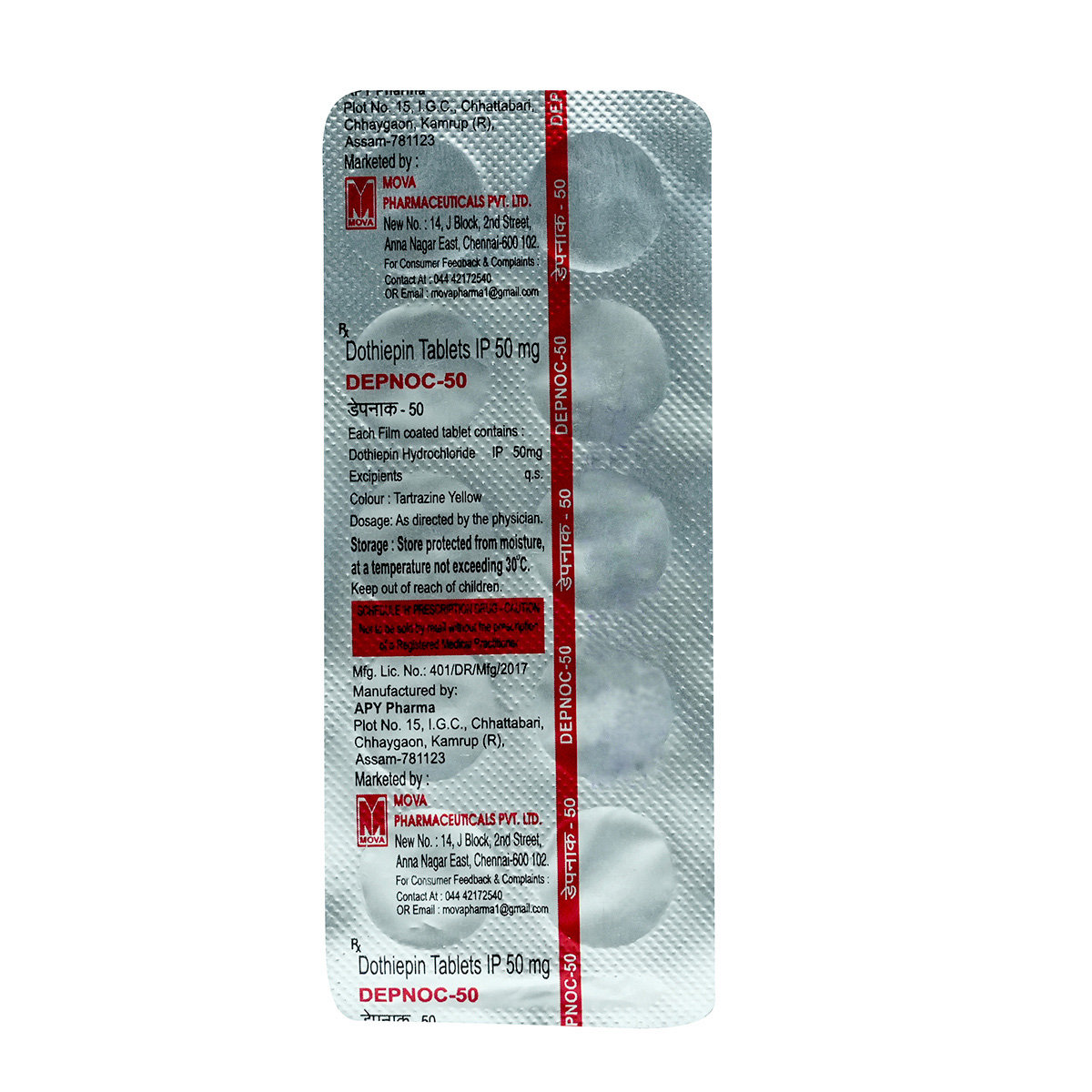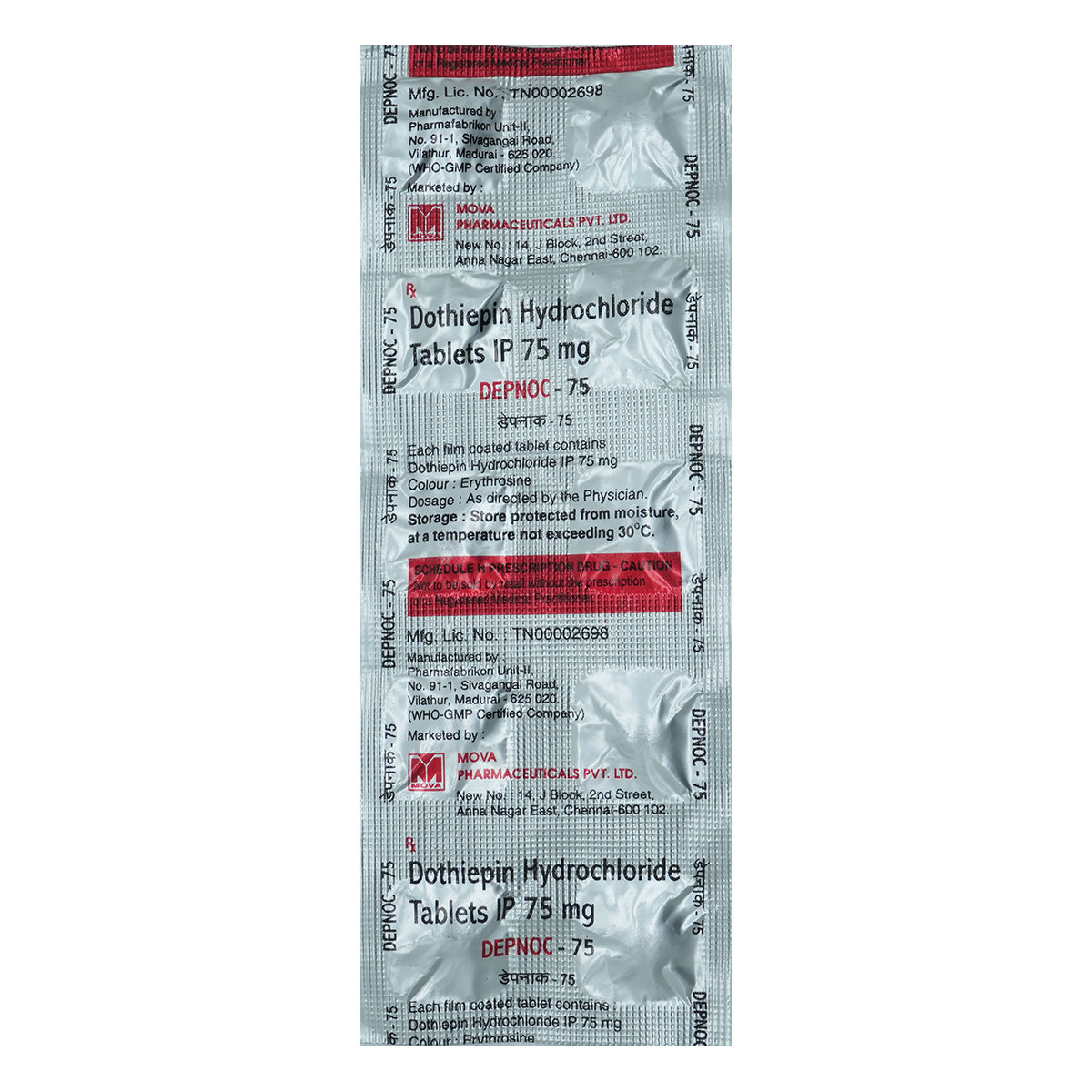Dosulepin
About Dosulepin
Dosulepin belongs to the class of tricyclic antidepressants. It is primarily used to treat depression that is unresponsive to other antidepressants or any other alternative treatment. It is also used to treat disorders related to anxiety.
Dosulepin works by increasing levels of chemical messengers that stabilise and elevate mood. It also stops your brain from releasing the chemicals which cause anxiety. It provides relief from symptoms such as feelings of restlessness, irritability, tiredness, difficulty concentrating, feeling, and sleep disturbances.
In some cases, you may experience increased heart rate, blurred vision, dizziness, dryness in the mouth and constipation. Most of these side effects of Dosulepin do not require medical attention and gradually resolve over time. However, if the side effects are persistent, reach out to your doctor.
Do not take this medicine if you have any lung disease, muscle weakness (myasthenia gravis), a sleeping disorder or difficulty in sleeping (sleep apnoea), severe liver disease or a problem with alcohol or other prescription or recreational drugs. Inform your doctor if you are planning to get pregnant, are pregnant, or breastfeeding.
Uses of Dosulepin
• Depression Treatment: Dosulepin treats depression by balancing brain chemicals to alleviate symptoms.
• Anxiety Relief: Dosulepin helps to reduce anxiety and promote calmness in patients with anxiety disorders.
• Chronic Pain Management: Dosulepin is prescribed for chronic pain management, reducing pain perception and improving quality of life for patients living with pain.
• Sleep Disorders: Dosulepin sedative properties can help patients with insomnia or sleep disturbances, promoting better sleep quality.
• Fibromyalgia Symptom Management: Dosulepin helps to manage fibromyalgia symptoms by providing relief from widespread pain and improving overall function.
Medicinal Benefits
- Dosulepin helps stabilise and elevate mood by increasing the levels of mood-regulating chemical messengers in the brain.
- It provides relief from anxiety and depression by balancing neurotransmitter activity.
- It reduces symptoms such as restlessness, irritability, tiredness, and difficulty concentrating.
- Improves sleep quality and reduces sleep disturbances associated with anxiety or mood disorders.
- Dosulepin enhances overall mental well-being and emotional stability.
- It helps individuals carry out daily activities more easily by improving focus and motivation.
- Dosulepin contributes to a better quality of life in people experiencing mood and anxiety-related conditions.
Directions for Use
- Dosulepin can be taken with or without food as advised by your doctor.
- Follow your doctor's instructions on the dosage and timing of this medication.
- Swallow Dosulepin as a whole with a glass of water.
- Do not crush, break, or chew it.
Storage
Side Effects of Dosulepin
- Increased heart rate
- Blurred vision
- Dizziness
- Dryness in the mouth
- Weight gain
- Sudden lowering of blood pressure on standing
- Difficulty in urination
- Constipation
Drug Warnings
- Do not take Dosulepin if you are allergic to any of its components.
- Inform your doctor if you have irregular heartbeat, liver or kidney problems, glaucoma, prostate problems, mania, epilepsy, diabetes, an overactive thyroid, porphyria (blood disorder), or heart problems.
- Consult your doctor if you are pregnant or breastfeeding.
- Dosulepin is not recommended for children below 12 years of age.
- It is not recommended to drive after taking Dosulepin as it can make you feel drowsy.
- It is not recommended to take alcohol while taking Dosulepin to avoid unpleasant side effects.
- Let your doctor know if you are taking any other medicines, including supplements or herbal products.
Drug Interactions
Drug-Drug Interaction: This medicine may have an interaction with other antidepressants (phenelzine, iproniazid, isocarboxazid, nialamide, imipramine, desipramine, tranylcypromine, moclobemide), medicines used to treat Parkinson's disease (selegiline), antibiotic (linezolid), anti-manic (lithium), medicines used to treat migraines (sumatriptan), painkillers (tramadol), antacids (cimetidine, lansoprazole, omeprazole), anti-fungal (fluconazole), medicines used to reduce the risk of strokes(ticlopidine), St. John's Wort (Hypericum perforatum), blood-thinning medicines (warfarin, dipyridamole, phenprocoumon), antimalarials (mefloquine), medicines used for heart diseases (flecainide, propafenone), and medicines that decrease blood levels of potassium or magnesium.
Drug-Food Interaction: No interactions found.
Drug-Disease Interaction: Obese people (with a BMI greater than 25) should consult a doctor before taking Dosulepin.
Drug-Drug Interactions Checker List:
Safety Advice

Alcohol
unsafeIt is not recommended to take alcohol while taking Dosulepin to avoid unpleasant side effects.

Pregnancy
unsafeIt is advised not to take Dosulepin during pregnancy as it may pose a risk to the unborn baby. However, if you are already taking Dosulepin, please inform your doctor that you are pregnant.

Breast Feeding
cautionDosulepin passes in very small amounts in breast milk. It has not been linked with any side effects. However, caution is advised while taking it. Please inform your doctor if you are breastfeeding.

Driving
unsafeIt is not recommended to drive after taking Dosulepin as it can make you feel drowsy.

Liver
cautionCaution is advised while taking Dosulepin if you suffer or have suffered from liver diseases.

Kidney
cautionCaution is advised while taking Dosulepin if you suffer or have suffered from kidney diseases.

Children
unsafeDosulepin is not recommended for children below 12 years of age.
Habit Forming
Diet & Lifestyle Advise
- Opt for healthy food, which will, in turn, help elevate your mood.
- Exercise daily for at least 30 minutes a day. It will help you to reduce stress and improve your mood. It will also improve your quality of sleep.
- Take deep breaths to calm your mind.
- Follow a consistent sleep schedule (at least 8 hours a day).
- Manage your stress levels by doing activities that make you happy, such as watching your favourite show, reading a book, listening to music, and activities of your interest.
Special Advise
Do not stop taking dosulepin without talking to your doctor. You may suffer side effects if you stop taking it suddenly. If you and your doctor agree that you should stop taking dosulepin, your doctor will probably recommend reducing your dose gradually over several weeks.
Patients Concern
Disease/Condition Glossary
Depression: It is a mood disorder that affects day to day life of a person. A person may have symptoms such as feeling sad or feeling of loss and might have mood swings.
Anxiety: It is defined as an emotion that is characterized by feelings of tension, worried thoughts, and symptoms like increased blood pressure. Anxiety disorder also includes panic disorder which is characterized by sudden feelings of terror.
FAQs
Dosulepin is used to treat depression and anxiety. It works by increasing the levels of chemical messengers which are responsible for stabilising and elevating mood levels in the brain. It also stops your brain from releasing the chemicals which cause anxiety.
Dosulepin helps to elevate your mood levels. It helps you to get better sleep. It helps you to feel like yourself again.
It depends on your symptoms according to which your doctor will advise the dose and duration of Dosulepin. Please inform your doctor if you are planning to switch to any other antidepressant.
Dosulepin is not recommended to treat pain. Rarely, it is advised to treat nerve pain like fibromyalgia or to prevent migraine.
No, Dosulepin is not a habit-forming drug. However, it can cause side effects, especially when you stop taking it suddenly.
Dosulepin might cause weight gain, as taking it makes you feel hungry. However, it varies from person to person as some people might feel less hungry after taking it.
Dosulepin starts to show its full effect in 4 to 6 weeks. In case you feel that you are not feeling better or there is no improvement in the symptoms, please consult your doctor. In case you feel that you are experiencing any kind of side-effect after taking Dosulepin, please contact your doctor immediately.
Dosulepin may interact with several medications and impact their efficacy. So, taking any medications, including herbal or ayurvedic, other than those prescribed by the doctor, is not recommended.
No, it is not a muscle relaxant. Dosulepin is a tricyclic antidepressant medication used to treat depression.
Both Dosulepin and amitriptyline belong to the tricyclic antidepressant class used to treat symptoms of depression. However, do not replace the Dosulepin with amitriptyline unless recommended by the doctor.
Dosulepin and doxepin belong to tricyclic antidepressant class medications used to treat symptoms of depression. However, they may have different mechanisms of action. However, do not replace the Dosulepin with doxepin unless recommended by the doctor.
You may take several weeks or longer to experience the full effect of Dosulepin. Even if you are feeling good, continue to take Dosulepin. Do not discontinue taking Dosulepin without consulting your doctor. Before quitting, your doctor will most likely recommend that you gradually reduce your dose.
Dosulepin is associated with high mortality (death rate) in overdose. There is a low margin of safety between the maximum therapeutic dose and potentially fatal doses. So, you should strictly follow the dose and duration of Dosulepin as directed by the physician. Do not overdose at any cost. If you feel you or someone overdosed or experience any severe adverse events with Dosulepin, consult the doctor or go to the emergency room nearest hospital.
Caution should be exercised. The risk or severity of CNS depression can be increased when Diazepam is combined with Dosulepin.
No. Dosulepin is not intended to treat trigeminal neuralgia (sudden, severe facial pain. It's commonly described as a sudden shooting pain or as an electric shock to the jaw, teeth, or gums.).
No. $ name is not intended to treat burning mouth syndrome (a painful condition often described as a burning, scalding, or tingling feeling in the mouth that may occur every day for months).
Yes, Dosulepin is intended to treat depression. However, it is a prescription medication and should be taken only if the doctor prescribes it to you.
No. Dosulepin is not intended to treat IBS (irritable bowel syndrome). Dosulepin is a tricyclic antidepressant medication used to treat depression.
It is not intended for insomnia with depression alone. However, your doctor may suggest Dosulepin to treat insomnia with depression in some cases. Please consult your doctor for personalized guidance.
Dosulepin can change the way your nerves receive pain signals. This can help with some kinds of nerve pain, including fibromyalgia. However, it should only be taken as prescribed by the doctor.
Dosulepin is sometimes used to treat some types of nerve pain, such as fibromyalgia, or to prevent migraine. But it's not recommended or officially approved for pain relief.
Dosulepin works by increasing levels of a chemical called serotonin in the brain. This can improve your mood.
For depression, it usually takes 4 to 6 weeks for Dosulepin to work fully. However, it varies from person to person.
Dosulepin helps to lift your mood, so you feel better. You may notice that you sleep better and are feeling less anxious. Dosulepin will not change your personality. It'll simply help you feel like yourself again.
No, Dosulepin is not recommended for everyone. It can be harmful to some people and is very dangerous if you take too much. Take personalized guidance from your doctor by letting them know your medical condition and the medications you are taking.
Dosulepin is not addictive, but you may get withdrawal symptoms when you stop taking it, especially if you stop taking it suddenly. Withdrawal symptoms of Dosulepin may include giddiness, headache, insomnia, irritability, increased sweating, nausea, panic-anxiety and restlessness.
Some people feel sleepy while they're taking Dosulepin. If this happens to you, do not drive, cycle or use machinery or tools until you feel better.
It is recommended not to take alcohol while taking Dosulepin. It may make you feel drowsy or may impact how Dosulepin works. So, it would be best to stop drinking alcohol while on treatment.
Limited research is available on Dosulepin in pregnant women. So, talk to your doctor if you are taking Dosulepin and are planning a pregnancy or becoming pregnant. The doctor will help you weigh the risks and benefits to decide on the best treatment for you and your baby. Your mental health must be well treated during pregnancy, as it can affect you and your baby's wellbeing.
No clear evidence suggests that taking Dosulepin will reduce fertility in either men or women. However, speak to a healthcare professional before taking it about its potential benefits and risks.
No, Dosulepin is not recommended for children below 12 years of age. Please seek medical attention if you observe any depression symptoms in your kid.
Symptoms of overdose may include cold body temperature, coma (loss of consciousness for a period of time), feeling agitated, confused, or drowsy, fever, hallucination (seeing things or hearing voices that do not exist), irregular heartbeat, increase in pupil size, muscle stiffness, seizures, trouble concentrating and vomiting.
Take the missed dose as soon as you remember, unless it's almost time for your next dose. In this case, skip the missed dose and take your next dose at the regular time. Never take a double dose to make up for a missed one.





